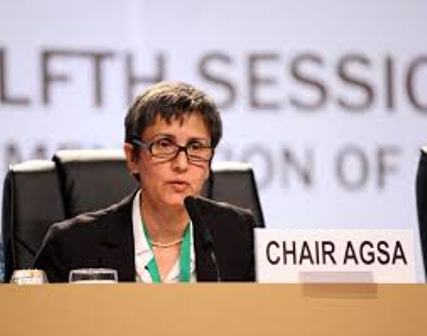
IPBES is placed under the auspices of four United Nations entities: UNEP, UNESCO, FAO and UNDP and administered by UNEP. Its secretariat is hosted by the German government and located on the UN campus, in Bonn, Germany.
In an interview with IRNA on the sidelines of an international conference on sand and dust storm in Tehran, Dr Mariam Akhtar-Schuster said, “We should try to avoid creating structures and instruments which only lead us to exchange views and not to do anything.”
“We should develop a regional science policy and technology interface to combat sand and dust storm and find ways to reverse the impact which have already emerged from them,” she added.
Akhtar-Schuster noted that the sand and dust storms are global phenomena and trans-boundary, adding that they can only be resovled through taking care of soil and vegetation at the local and national levels.
“It means that you need a very good governance and land planning systems and this instrument can only be developed at the national level and not at the regional or international level because each country has its own specific needs; be it cultural, economic, social or environmental, “ she added.
Akhtar-Schuster underlined that any program has to be very pragmatic and this means that local and national governments are obliged to do something instead of turning to speaking clubs at the global levels without doing any action.
“At the national level, a good monitoring system is required to see whether the instrument which is used on the ground really being successful,” she noted, adding that some instruments would need to be re-engineered in order to get adjusted to the local conditions.
Neighbors should not be competing, but they should try together to make a strong region, Akhtar-Schuster noted, adding that this collaborative spirit should emerge.
“I have heard a lot of different perspectives on the effect of dam construction on making the dust storms, but I think we need a lot of scientific research and really evidence-based knowledge in order to find out which dams create what issues in the region and we should not blame anybody, rather we should just join hands to solve the problem,” she said.
Akhtar-Schuster noted that the UN can be a very important tool to make these regional interfaces between science, technology, policy visible at the international level; so whatever development, this region might be developing, it could become an example for other regions as well.
A strong regional spirit and a strong participation of the local land users is needed, she said, adding that dust storm is a natural issue resulted from the climate change but misusing, overexploitation, destroying the vegetation cover as well as excessive use of soil and water have also intensified the problem.
“I would say it was better for the US to collaborate not single out because the issue is an international one rather than to be a national matter,” she said, referring to Washington decision to exit the Paris Climate Change Agreement.
Interview by Hamdollah Emadi Heydari
9191**1771
www.irna.ir
 solhkhabar | Peace International News Agency Peace International News Agency , Peace News , International Agency News of Peace
solhkhabar | Peace International News Agency Peace International News Agency , Peace News , International Agency News of Peace